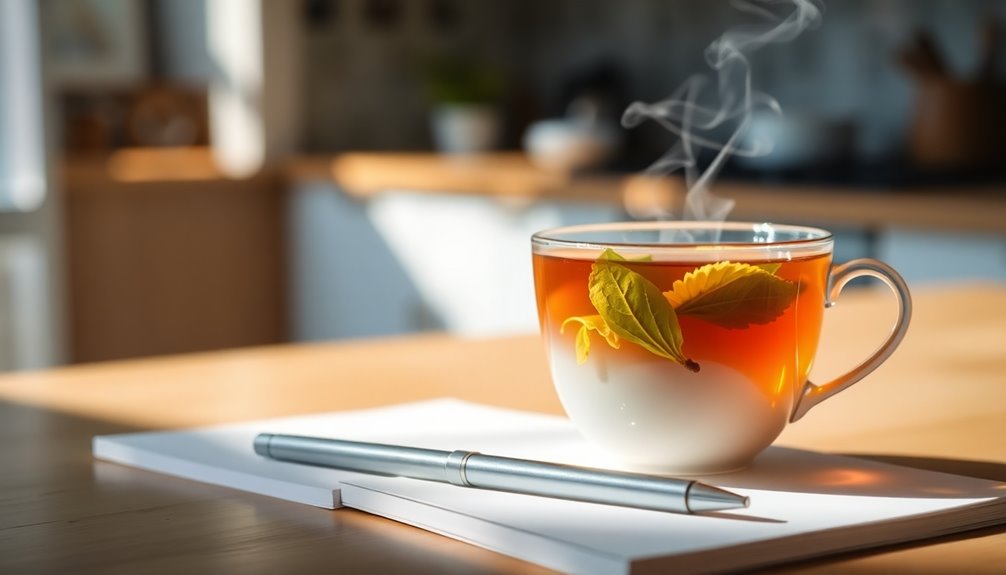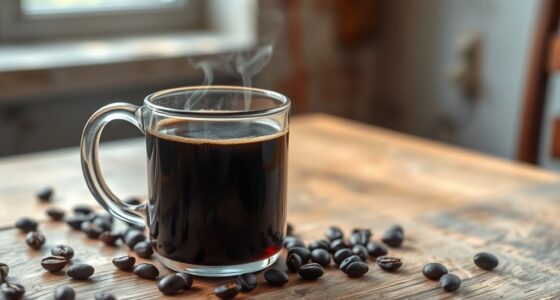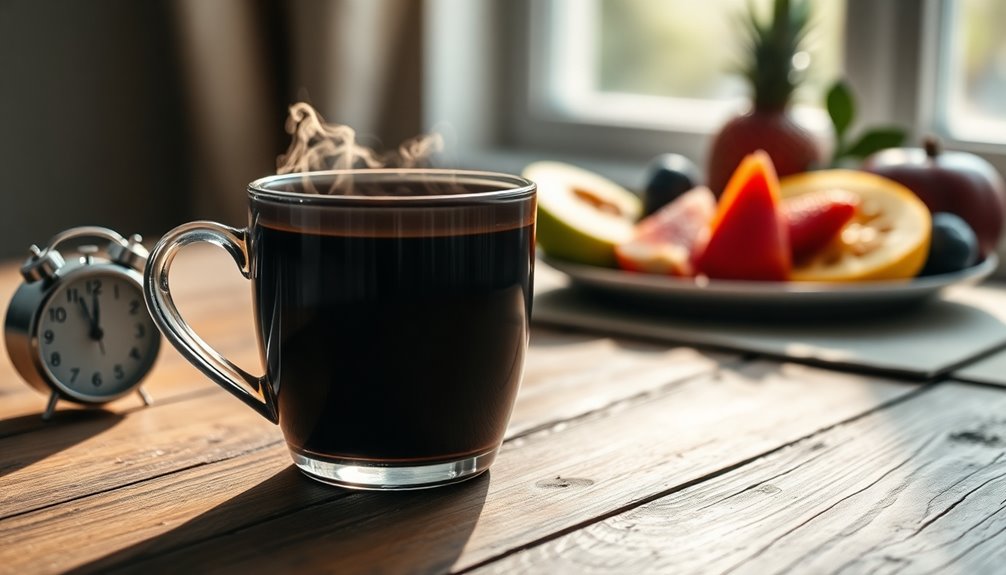You can't drink herbal tea while fasting for a blood test. Even caffeine-free options can impact your results by introducing sugars and phytochemicals. These substances can alter hydration and metabolic responses, leading to inaccurate readings, especially for glucose and lipid panels. To guarantee the reliability of your test, stick to water only during the fasting period, which typically lasts 8 to 12 hours. Staying properly hydrated is essential. For guidance on preparing for your blood test and understanding fasting requirements, there's more to explore that can help you avoid potential complications.
Key Takeaways
- Herbal teas can alter hydration and metabolic responses, affecting the accuracy of blood test results.
- Only water is acceptable during fasting; herbal teas introduce sugars and phytochemicals that can skew outcomes.
- Caffeine in herbal teas can impact test accuracy, even in small amounts, causing variability in results.
- Adhering strictly to beverage guidelines is essential for reliable results in fasting blood tests.
- Consulting with a healthcare provider ensures understanding of specific fasting requirements for different tests.
Fasting Requirements for Blood Tests
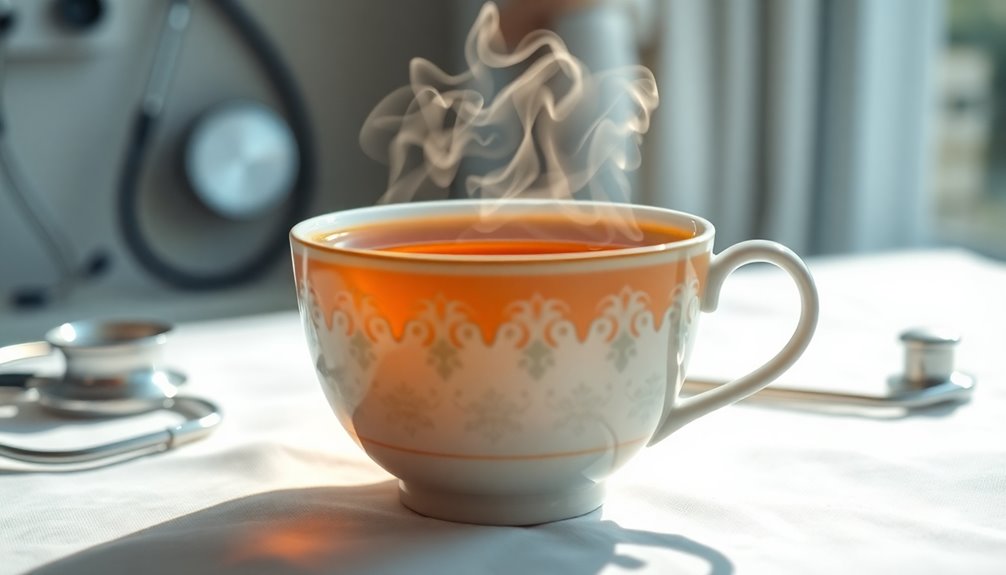
When preparing for a blood test, it's vital to understand the fasting requirements to guarantee accurate results. Typically, you'll need to refrain from any caloric intake for 8 to 12 hours.
Many patients mistakenly think that beverages like herbal tea are acceptable during this fasting period. However, even caffeine-free herbal tea can influence test outcomes, so it's best to avoid it entirely. Water is usually the only drink you can have, and it's important for staying hydrated.
Since specific fasting instructions may vary depending on the blood test, always consult your healthcare provider for tailored guidelines. Being aware of these fasting requirements can help secure the reliability of your test results and prevent any unnecessary complications.
Effects of Herbal Tea on Fasting

While herbal teas might seem harmless due to their caffeine-free nature, they can greatly affect fasting for blood tests.
Even though you may think you're doing your body a favor, consuming herbal tea introduces phytochemicals and sugars that can skew your blood test results. This means your hydration and metabolic responses could be altered, leading to inaccurate readings, especially in tests like glucose and lipid panels.
Many healthcare providers recommend sticking to water only during fasting to guarantee reliable outcomes.
If you want to avoid misleading blood test results, it's essential to follow specific fasting guidelines, including steering clear of herbal teas, as over 50% of individuals remain unaware of these requirements.
Caffeine and Blood Test Accuracy
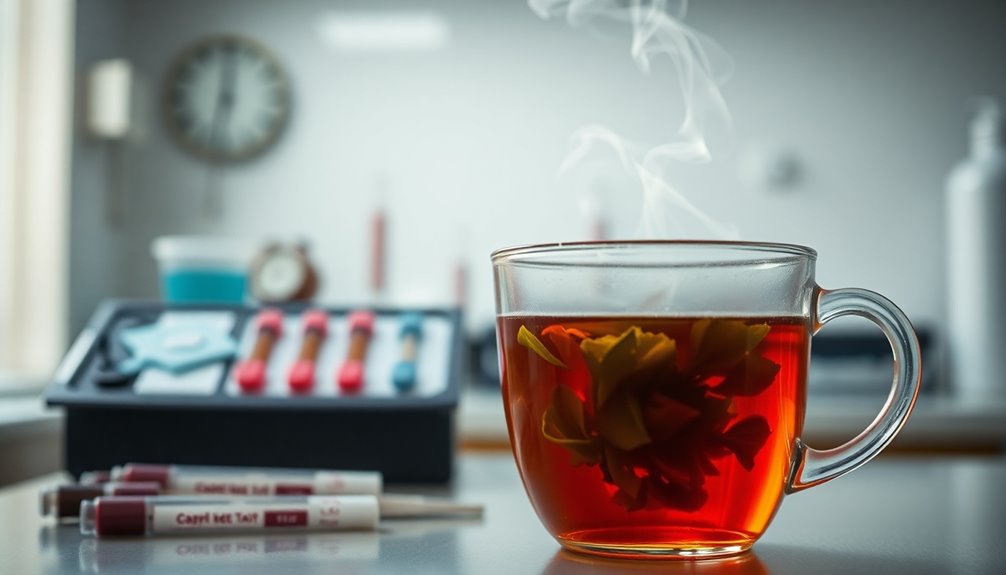
Caffeine can greatly impact the accuracy of blood test results, making it essential to avoid any caffeinated beverages before your appointment.
Even small amounts of caffeine can influence hydration and blood levels, potentially leading to inaccurate outcomes. When you're fasting, you want to make certain that nothing interferes with the results, and caffeine can create variability similar to other substances.
Studies show that even herbal teas, which may contain caffeine or other compounds, can disrupt biochemical markers.
To achieve the most reliable blood test accuracy, stick to plain water during your fasting period. By doing so, you eliminate the potential interference from caffeine and other substances, making sure your test results truly reflect your health status.
Recommended Beverages During Fasting

To guarantee accurate blood test results during fasting, it's important to choose your beverages wisely. The best option is plain water. Avoiding other drinks guarantees you stay within the fasting guidelines and supports accurate results.
Here are four key points to remember:
- Water is the only beverage recommended before a fasting blood test.
- Herbal teas, even caffeine-free, can introduce substances that may skew results.
- Compounds in drinks can affect hydration levels, further complicating the accuracy.
- Sticking to water helps you maintain ideal fasting conditions.
Importance of Staying Hydrated
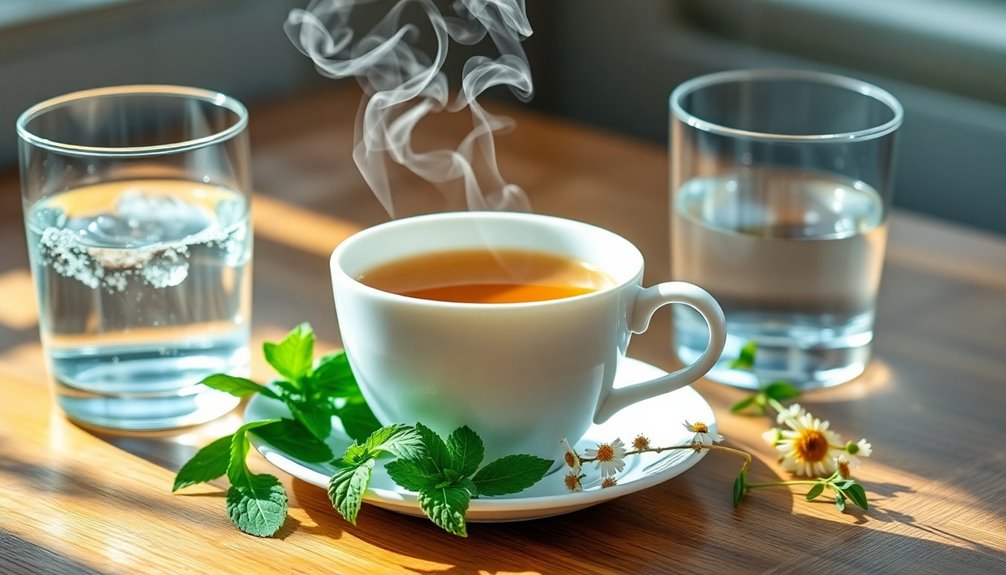
Staying hydrated is essential during fasting, especially before a blood test.
Water plays an important role in maintaining hydration, helping to alleviate hunger pangs and keep your blood vessels more visible for easier blood draws.
When you drink water, it supports your body in managing the fasting process, reducing the risk of dizziness or fainting.
Adequate hydration also prevents complications during the blood draw, as dehydration can make your veins less prominent and harder to access.
It's recommended to drink several glasses of water in the days leading up to your test to guarantee ideal hydration.
Common Blood Tests That Require Fasting

When preparing for certain blood tests, fasting is essential for accurate results.
For example, glucose tests usually require an 8-hour fast, while lipid panels often need you to fast for 10 to 12 hours.
It's important to check with your healthcare provider about specific fasting guidelines for the tests you'll be undergoing.
Key Fasting Requirements
Fasting plays an essential role in ensuring accurate results for several common blood tests, particularly those evaluating glucose and triglyceride levels.
Here are some key fasting requirements you should know:
- Glucose Tests: Require an 8-hour fast.
- Triglyceride Tests: Need a fast of 10 to 12 hours.
- Basic Metabolic Panel: Fasting measures are vital for precise readings.
- Lipid Panel & Liver Function Tests: Accurate results depend on avoiding food or drink before the test.
While some tests may allow for non-fasting results, sticking to traditional fasting guidelines is critical to avoid skewed data and potential misdiagnosis.
Always consult your healthcare provider to understand the specific fasting measures for the blood tests you need.
Types of Fasting Tests
Understanding the types of fasting blood tests is vital for getting accurate results. When fasting for a blood test, you'll often need to fast before a blood draw for several common assessments.
Glucose tests require an 8-hour fast to guarantee precise blood sugar readings. Lipid panels, which check cholesterol and triglyceride levels, typically need a fast of 10 to 12 hours. Basic metabolic panels evaluating kidney function also necessitate fasting for accurate results.
Additionally, liver function tests assess liver health and usually require fasting to avoid interference from food. Some vitamin and hormone level tests may have specific fasting protocols, so it's important to consult your healthcare provider for tailored instructions to make sure you're prepared properly.
Managing Fasting for Children

Although preparing your child for a blood test can be challenging, managing their fasting period doesn't have to be overwhelming.
Here are some tips to make it easier:
- Schedule the test early: This minimizes the fasting time.
- Focus on hydration: Encourage your child to drink water before the test to help with the blood draw.
- Use distraction techniques: Engage them with cartoons or games to ease their anxiety.
- Prepare a snack: Have something ready for them to eat immediately after the test to combat hunger.
Guidelines for Pregnant Individuals

When preparing for a blood test, pregnant individuals face unique considerations that differ from those of children or non-pregnant adults.
It's vital to consult your healthcare provider for specific fasting guidelines tailored to your needs. Staying hydrated is often recommended, but you'll want to confirm if plain water is allowed before your test.
Fasting might also worsen heartburn symptoms, so extra hydration and careful planning can help manage discomfort. Additionally, consider how fasting may affect your energy levels and overall well-being.
Discuss any concerns with your healthcare provider to guarantee you're making the best choices for both you and your baby. Your health is paramount, so don't hesitate to seek personalized advice.
Best Practices for Accurate Results
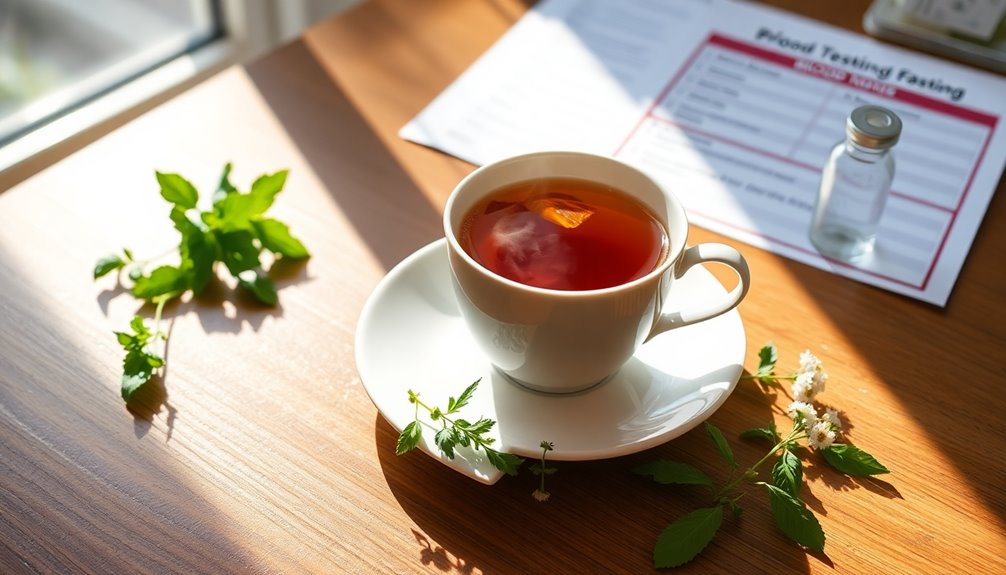
To get the most accurate results from your fasting blood test, you need to pay attention to the fasting duration and what you drink beforehand.
Stick to plain water for 8 to 12 hours before your test, as any other beverage, including herbal tea, can interfere with your results.
Following these guidelines will help guarantee your test is as precise as possible.
Fasting Duration Importance
Understanding the importance of fasting duration can greatly impact the accuracy of your blood test results. Adhering to fasting requirements is essential for obtaining accurate results, especially for tests like glucose and triglycerides.
Here are some best practices to keep in mind:
- Fasting Duration: Aim for 8 to 12 hours before your test.
- Schedule Wisely: Book your test early in the day to reduce fasting time.
- Stay Hydrated: Drink water to help with blood draws and curb hunger.
- Consult Your Provider: Different tests may have varying fasting requirements.
Beverage Restrictions Prior to Testing
Fasting isn't just about the duration; what you consume during that time matters too. To achieve accurate results, strict beverage restrictions are essential. Water is the only acceptable drink during your fasting measures. Consuming herbal tea, even if caffeine-free, can introduce substances that skew your test results.
| Allowed Beverages | Not Allowed Beverages |
|---|---|
| Water | Herbal Tea |
| Coffee | |
| Juice |
Prior to tests like glucose and triglycerides, even minor deviations from these guidelines can lead to inaccurate readings. Always communicate with your healthcare provider about fasting requirements to guarantee you adhere to the rules for the best possible outcomes.
Frequently Asked Questions
Can You Drink Herbal Tea Before a Fasting Blood Test?
You might think herbal tea is harmless, but it can actually affect your body in ways you don't expect.
Even though it’s caffeine-free, herbal tea contains compounds that can alter your hydration and metabolism. Many people enjoy herbal tea for its soothing properties, as it can offer various health benefits without the stimulating effects of caffeine. In addition to its hydrating qualities, some herbal teas are known for their specific therapeutic effects, such as tea remedies for hemorrhoids, which can help alleviate discomfort and promote better digestive health. Whether consumed for relaxation or health purposes, herbal tea remains a popular choice among those seeking natural alternatives for wellness.
To guarantee accurate results, it's best to stick to plain water before your blood test.
Always follow your healthcare provider's guidelines so you can avoid any surprises when you get your test results back.
What Can You Drink if Fasting for a Blood Test?
When you're fasting for a blood test, it's essential to stick to plain water.
Other beverages, including herbal teas, can interfere with test results. Even though herbal teas are caffeine-free, they contain compounds that might affect your hydration or alter outcomes.
To guarantee accuracy, avoid flavored or sweetened drinks.
Always follow your healthcare provider's instructions when it comes to what you can drink during fasting to maintain the integrity of your test results.
Can You Drink Herbal Tea When Fasting?
When you're pondering whether herbal tea is a good companion during your fasting journey, it's wise to tread carefully.
While herbal teas seem harmless, they can sneak in substances that might alter your results. It's best to stick with plain water to verify your fasting remains effective.
Staying hydrated is key, so enjoy that revitalizing water, and save the herbal delights for after your tests to guarantee accurate results.
What Can Throw off a Blood Test?
When it comes to blood tests, several factors can throw off your results. Consuming non-water beverages, like herbal teas or juices, can introduce compounds that may skew your readings.
Medications, food, and even exercise before the test can impact results too. Dehydration or excessive hydration can also lead to inaccurate outcomes.
To guarantee reliable results, it's best to follow your healthcare provider's fasting guidelines strictly and avoid any potential disruptors.
Conclusion
In summary, while herbal tea might seem harmless, it's best to stick to water when fasting for a blood test. Remember, "an ounce of prevention is worth a pound of cure." Staying hydrated with plain water guarantees you get accurate results and avoid any surprises. If you have questions about your specific situation, don't hesitate to consult your healthcare provider. They can guide you on the best practices to follow for your tests.
